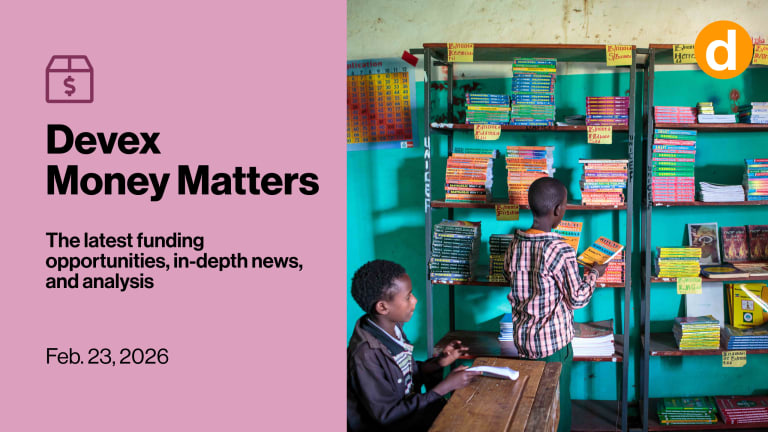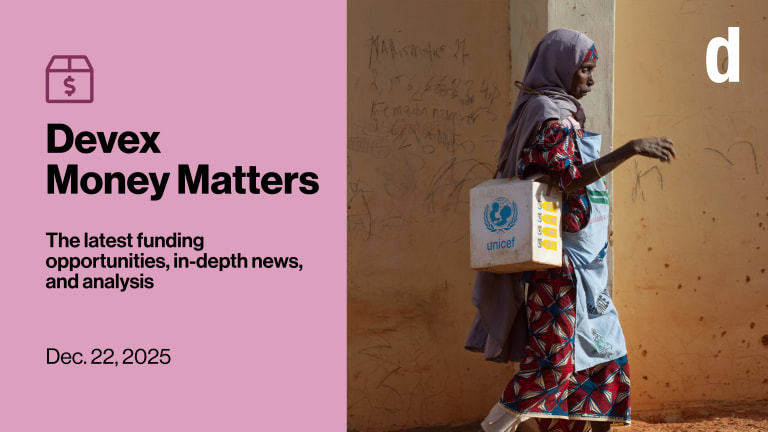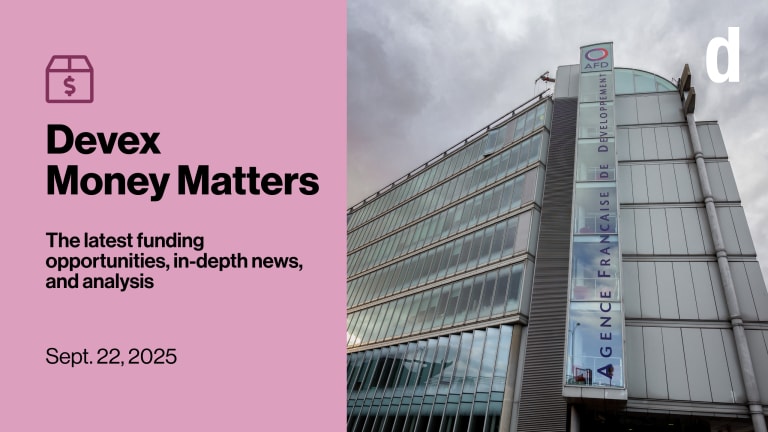
Latin America and the Caribbean received $10 billion worth of aid in 2022. But where did it come from, and where did it go? We broke down the latest numbers.
Also in this edition: A new philanthropic prize to curb lead exposure, a coalition to bring more money to Sudan, and a boost for education in conflict zones
+ Are there topics you want to read more about in Money Matters? We want your feedback.
¿Dónde está el dinero?
Latin America and the Caribbean is a region of extremes. Its highest decile of earners make 12 times more than their lowest-income counterparts, according to the United Nations Development Program — a rate much higher than the global average of four. That’s one of the reasons why $9.8 billion in development assistance flowed to the region in 2022, with Colombia taking home the largest portion of those funds, $1.9 billion, and Grenada receiving the least, $2.3 million.
Unsurprisingly, the United States was the biggest donor to the region, contributing a whopping $2.8 billion in 2022 alone. That accounted for nearly one-third of all official development assistance toward Latin America and the Caribbean, with Colombia taking home the biggest chunk of U.S. funds: more than $572 million.
Germany and France were the region’s next top donors, contributing $2.4 billion and $1.4 billion, respectively.
Read: Who’s funding development projects in Latin America and the Caribbean? (Pro)
ICYMI: The world wealth gap has grown post-pandemic — but where has it been worst? (Pro)
+ Your Devex Pro membership gives you access to all our exclusive reporting and analysis. Not yet a Pro member? Access all our exclusive reporting and analyses, data-driven funding insights, career resources, and more by starting your 15-day free trial today.
Funding activity
We publish tenders, grants, and other funding announcements on our Funding Platform. Here are some of the ones that have been viewed the most in the past 10 days.
The Development Bank of South Africa is seeking a service provider to develop a business and operational management plan to enhance commercial activity and provide community services in South Africa.
The United Nations is seeking consultancy services to address the health problems of the population in the context of mobility in Mexico.
Japanese donor JICA is seeking services to conduct a preparatory survey for the improvement of the water supply system in Zambia.
The World Bank has approved an $800 million financial package to advance the transition to an inclusive and resilient market economy in Uzbekistan.
USAID has announced additional funding to support the improvement of literacy and math skills for students in the Philippines.
+ Try out Devex Pro Funding today with a free five-day trial, and explore funding opportunities from over 850+ sources in addition to our analysis and news content.
A year of war in Gaza
Today marks the first anniversary of Hamas’ attack on Israel — and Israel’s resulting siege in Gaza that has shattered the territory and left more than 41,000 dead. It’s seen more aid workers die than any other comparable conflict, and 2024 is on course to be the bloodiest year ever for the sector as a result.
The cost of the war has been considerable, in terms of the amount of aid needed. Around $3.36 billion of aid has flowed into the country so far, according to the United Nations Office for the Coordination of Humanitarian Affairs.
My colleague David Ainsworth has produced some statistics charting the impact of the war so far, and we’ve also updated our funding tracker, first produced in the first days of the conflict, to show who’s provided the most support.
Read: Who’s sending aid to Gaza
More reading: What is the state of aid in Gaza?
Lead-ing the way
At the United Nations General Assembly, UNICEF and USAID launched a new, $150 million partnership to reduce lead exposure across the world. It’s an issue that kills 1.5 million people every year — but before the partnership was launched, donors were spending just $15 million on the topic annually.
Now, a collection of donors, organizations, and partners have teamed up to combat lead exposure, and one of those partners — Rockefeller Philanthropy Advisors, or RPA — gave Devex an inside look at their contribution to the cause. Last week, the wealth advisory organization announced a $10 million fund to scale up technology to monitor, measure, and test for lead levels in the blood and the environment.
To do that, RPA will be launching an innovation prize program to elevate those solutions, along with an expert advisory board to source, vet, and scale opportunities. It’s the first in a series of upcoming “big bet” initiatives RPA will be launching, Latanya Mapp Frett, the president and CEO of RPA, told Devex.
“We hold a great deal of intelligence at RPA, and really where we are trying to move is to figure out how that intelligence can help identify opportunities and gaps in the philanthropic field and the world,” she added. “We are just getting started.”
Read: USAID, UNICEF announce $150M partnership for a lead-free future
A boost for Sudan
For 18 months, Sudan has been torn apart by civil war — and for just as long, Sudanese organizations have been on the frontlines of the humanitarian response. Now, many of those groups will be getting a leg up through the Coalition for Mutual Aid in Sudan, a multibillion-dollar initiative that will direct flexible emergency grants to vetted, local organizations across the country.
“A lot of it is about recognizing that we have not been seeing what is already there, so what we’re asking philanthropy to do is see what is there already,” said Patricia McIlreavy, president of the Center for Disaster Philanthropy, which is a member of the Mutual Aid coalition. “And recognize that in some ways, [local organizations are] the only way that people in Sudan are receiving assistance right now.”
There are 15 philanthropies behind the coalition, including McIllreavy’s CDP. The group aims to channel $2 million to local Sudanese organizations by the end of this year, and push for a minimum of $4.5 million more from peer philanthropies over the next two years.
Watch: New Sudan coalition aims to channel help to local responders
More good news
The Yidan Prize Foundation has revealed its winners of this year’s twin $3.8 million awards: War Child Alliance, an international organization focused on supporting children in conflict; and Wolfgang Lutz, an Austrian demographer who focuses on the impact of investing in education.
“Education needs to be recognized more as a space for innovation, along with the capacity and potential that it has to reach people,” said Lucy Lake, the director of global engagement at the Yidan Prize Foundation. “Both of these prizes show just how important education really is for development more widely.”
Since 2017, the Yidan Prize has awarded money to organizations and individuals working toward educational research and practice — providing both cash prizes and a project fund for the winners to scale-up their work. Through the Yidan Prize, War Child will grow their Can’t Wait to Learn project, an initiative that brings literacy and numeracy skills to children blocked from the classroom due to conflict. Lutz will establish research centers in South Africa and Thailand, both of which will focus on training statisticians to influence policy-making decisions on education.
Read: War Child Alliance wins $3.8 million prize for digital learning program
Sign up to Money Matters for an inside look at the biggest stories in development funding.








